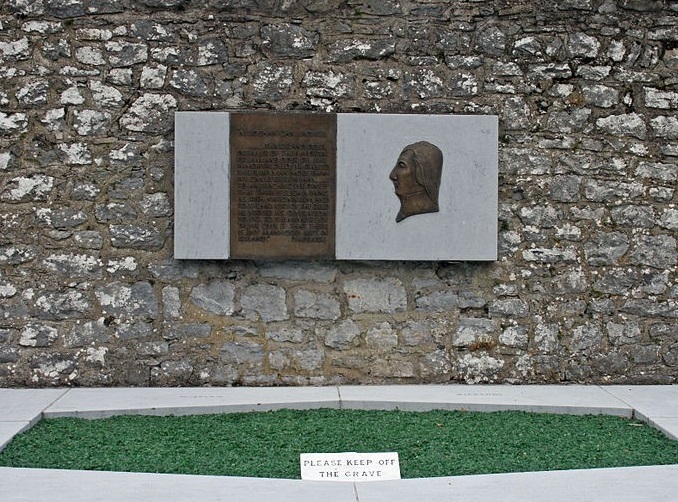Wolfe Tone

A gravestone in a cemetery in Bodenstown, County Kildare, Ireland marks the resting place of Theobald Wolfe Tone (20 June 1763 – 19 November 1798). Known as Wolfe Tone he is one of the founders of the United Irish Men and seen as the father of Irish republicanism. Every year on the last Sunday of June a pilgrimage is held at the cemetery in his honour.
Wolfe Tone is an important figure in Irish history. Born to a Protestant family in Dublin he is seen as the major figure in the early development of Irish republicanism. He qualified as a barrister after attending Trinity College Dublin and went on to become involved in Irish politics. This was at time when the ideas spread by the French Revolution were having a major influence internationally. Along with Thomas Russell, Napper Tandy and others he founded the Society of the United Irish Men in 1791. Developing from reformist objectives the society quickly began to promote the complete independence of Ireland from England.
Believing that only armed struggle could achieve these objectives, Wolfe Tone went on to try and gain military support from France. When this became known to the English, they worked to break the organisation of the United Irish Men. The Society was banned in 1793 in the same year that France went to war with Britain. A number of their leaders were forced into exile with Wolfe Tone arriving in America in May 1795. After a year he returned to Europe and in Paris sought French help in an invasion of Ireland. The French did send ships and men to Ireland but weather conditions at the time did not allow them to land and they returned to France. The British Government then set in motion a campaign of intimidation to break the Society involving the use of brutality when said to be searching for weapons.
The United Irish Men then sought to create insurrection on their own. In 1798 they devised a plan to capture strategically important positions in Dublin. This plan was undermined by the arrest of important leadership figures in May 1798 that effectively cut of the chain of command and the plan failed. Their forces outside of the Dublin fell, but some success was achieved in Wexford. Subsequent risings in Antrim and Down were also defeated. The forces raised against them were overwhelming. A landing of a small group of French forces in August of 1798 who united with the Irish fighters was too late to retrieve the situation. Many brave Irish men and women, often armed with only the most basic of weaponry were executed. Wolfe Tone was eventually captured and sentenced to death. He died in Provost prison in November 1798 aged 35. He was not hanged but died of a neck wound, the result it is said of an attempted suicide attempt, although some doubt this account of his death. Wolfe Tone died a committed republican and believer in a free and independent Ireland.
The famous Irish Band Wolfe Tones take their name from this great patriot.
Wolfe Tone: Prophet of Irish Independence
Get your copy from Amazon.com (US$) or Amazon.co.uk (GB£):
- Irish
- English
- Log in to post comments





